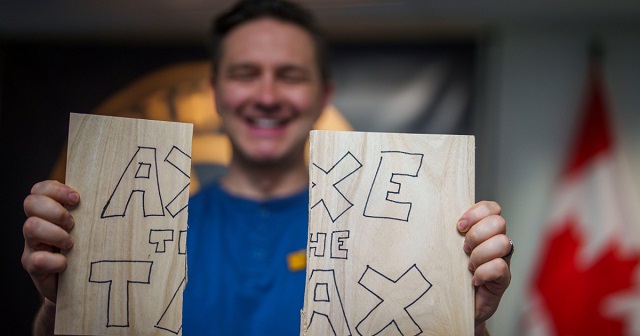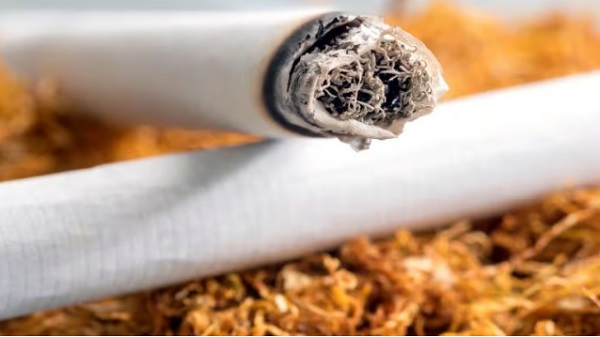Dan McTeague
The Carbon Tax ship is sinking

From Canadians for Affordable Energy

In a shocking turn of events, just weeks before the upcoming provincial election, Eby said that if re-elected his government would end the provincial carbon tax on consumers, provided the federal government removed the “legal backstop” that requires them to keep a tax in place.
Here’s a surprising development – the Carbon Tax, which was a keystone policy of the Green Left just a few short years ago is now a political pariah. Though, for some of us, it isn’t so surprising.
As you will recall, the federal Carbon Tax back was one of the Trudeau Liberals’ first announcements upon taking power. It was meant to set the tone for their commitment to tackling the “climate crisis,” and achieving net zero carbon emissions. The policy required that all provinces and territories which did not have their own carbon pricing scheme in place would have one imposed on them by Ottawa.
The Carbon Tax had buy-in from Green apologists all over the country, including many Conservative politicians. You may recall Patrick Brown, former leader of the Ontario Progressive Conservative Party, stunning an audience of PC Members in 2016 when he announced. “Climate change is a fact… We have to do something about it, and that something includes putting a price on carbon.” Ever the political opportunist, Brown had bought into the notion that you can’t win if you aren’t in favor of a carbon tax.
And that is how it was sold. The carbon tax was inevitable. And it would come with all sorts of environmental benefits – ending forest fires, floods, and combatting all manner of bad weather. Plus, the price would mainly be paid by greedy corporations. The average Canadian, they said, would actually be getting more money back on the tax rebate than they’d paid in the first place. In their telling, the carbon tax sounded like it was all carrots and no sticks!
Of course, that was too good to be true. There were, in fact, plenty of sticks. Sky-high gas prices, heating bills, food prices, and an overall increase in our cost of living. Eventually the Parliamentary Budget Office issued a report which confirmed what many Canadians had already learned, that the tax would be a net loss for most households, with the middle class being particularly hard hit.
No wonder public support started to wane, and then to spiral. Even Trudeau’s desperate rebranding – he started calling the tax “pollution pricing” – couldn’t save it.
A Leger poll released earlier this year revealed that 7 in 10 Canadians do not support the Carbon Tax. It helps that Conservative Party leader Pierre Poilievre has made ‘Axe the Tax’ a cornerstone of his campaign, consistently making the case that the Carbon Tax is harming consumers and making the country less competitive.
What was once considered the unsinkable Carbon Tax is now taking on water. And lots of it.
We saw early signs of this earlier this year when the annual Carbon Tax increase, scheduled for April 1st, was loudly opposed by a number of premiers. Even Liberal premiers, such as Andrew Furey of Newfoundland and Labrador, pleaded with Justin Trudeau to hit pause on the increase.
More recently, NDP Leader Jagmeet Singh has been waffling on the tax as currently structured, suggesting that it has “put the burden on the backs of working people.” Of course, as the Conservatives like to remind him, Singh voted in favor of this same tax twenty-four times in the House of Commons.
But perhaps the most significant nail in the carbon tax coffin came courtesy BC Premier David Eby. Remember that it was BC, under the Liberal premier Gordon Campbell, who implemented the first Carbon Tax in 2008 – not just the first in Canada, but rather, the provincial government claims, the first “revenue neutral” Carbon Tax in the world!
The Carbon Tax has been a hallmark of BC’s climate policies for nearly two decades. But in a shocking turn of events, just weeks before the upcoming provincial election, Eby said that if re-elected his government would end the provincial carbon tax on consumers, provided the federal government removed the “legal backstop” that requires them to keep a tax in place.
With Eby’s main opposition also pledged to repeal, it seems that even in the policy’s birthplace, no one wants to touch the carbon tax with a ten foot pole!
Now Eby defended the move by claiming essentially that the Trudeau Liberals’ fumbling of the issue has “badly damaged” what he says was the political consensus on the carbon tax. But the reality is that this was bound to happen eventually. In my capacity as President of Canadians for Affordable Energy, I’ve been warning Canadians for years that Trudeau’s carbon tax increase, compounded by his Clean Fuel Standard, which I’ve dubbed the Second Carbon Tax, would not only raise the price of fuel, but would increase the price of all goods, groceries included.
Once Canadians saw what the tax actually cost, and felt its devastating impact on their ability to make ends meet, to fill their gas tanks, heat their homes, and feed their families, they were bound to turn against it. This is exactly what we’re seeing now. And with elections looming, as go the voters so go the politicians who need their votes.
It seems the Carbon Tax is sinking and the rats are jumping ship.
Dan McTeague is President of Canadians for Affordable Energy.
Automotive
Canada’s EV experiment has FAILED

By Dan McTeague
The government’s attempt to force Canadians to buy EVs by gambling away billions of tax dollars and imposing an EV mandate has been an abject failure.
GM and Stellantis are the latest companies to back track on their EV plans in Canada despite receiving billions in handouts from Canadian taxpayers.
Dan McTeague explains in his latest video.
Automotive
Canada’s EV subsidies are wracking up billions in losses for taxpayers, and not just in the auto industry

By Dan McTeague
To anyone who thought that the Liberals’ decision to postpone enforcement of their Electric Vehicle (EV) mandate by one year was part of a well-thought-out plan to get that disastrous program back on track, well, every day brings with it news that you were wrong. In fact, the whole project seems to be coming apart at the seams.
Here’s the latest crisis Mark Carney and his carnival of ideologues are having to deal with. Late last year, the Liberal party instituted a 100% tariff on Chinese-made EVs. The idea was to protect the Canadian EV industry from China dumping their vehicles into our country, at prices far lower than Canadian companies can afford due to their massive state subsidies. This has been a major problem in the EU, which is also attempting to force a transition to EVs.
But Beijing wasn’t going to take that lying down. Taking advantage of Western environmentalist sentiment is an important part of their economic plans — see, for instance, how they’ve cornered the global solar panel market, though the factories making them are powered by massive amounts of coal. So they retaliated with a 75% duty on Canadian canola seed and a 100% tariff on canola oil and canola meal.
This was big enough to really hurt Canadian farmers, and Ottawa was forced to respond with more than $300 million in new relief programs for canola producers. Even so, our farmers have warned that short-term relief from the government will do little if the tariffs are here for the long-term.
With pressure on Carney mounting, his Industry Minister Melanie Joly announced that the government was “looking at” dropping tariffs on Chinese EVs in the hope that China would ease off on their canola tariffs.
That may be good news for canola producers, but how about the automotive companies? They’ve grown increasingly unhappy with the EV mandate, as Canadian consumers have been slow to embrace them, and they’ve been confronted with the prospect of paying significant fines unless they raise prices on the gas-and-diesel driven vehicles which consumers actually want to make the EVs that they don’t really want more attractive.
That’s the context for Brian Kingston, CEO of the Canadian Vehicle Manufacturers’ Association, saying that dropping these tariffs “would be a disaster.”
“China has engaged in state-supported industrial policy to create massive overcapacity in EV production, and that plan is coming to fruition now,” Kingston said. “When you combine that with weak labour and environmental standards, Chinese manufacturers are not competing with Canadian, American, or Mexican manufacturers on a level playing field. We simply cannot allow those vehicles to be dumped into the Canadian market.”
The auto manufacturers Kingston represents are understandably upset about suddenly having to compete with underpriced Chinese EVs. After all, with the government forcing everyone to buy a product they really don’t want, are most people going to patriotically pay more for that product, or will they just grab whichever one is cheaper? I know which one I think is more likely.
And then there’s a related problem — the federal and provincial governments have “invested” somewhere in the neighborhood of $52.5 billion to make Canada a cog in the global EV supply chain. In response to Joly’s announcement, Ontario Premier Doug Ford, who has gone “all in” on EVs, wrote an open letter to the prime minister saying that canceling the tariffs would mean losing out on that “investment,” and put 157,000 Canadian automotive jobs at risk.
Now, it’s worth noting that automakers all over Ontario have already been cutting jobs while scaling back their EV pledges. So even with the tariffs, this “investment” hasn’t been paying out particularly well. Keeping them in place just to save Doug Ford’s bacon seems like the worst of all options.
But it seems to me that the key to untangling this whole mess has been the option I’ve been advocating from the beginning: repeal the EV mandate. That makes Canada less of a mark for China. It benefits the taxpayers by not incentivizing our provincial and federal governments to throw good money after bad, attempting to subsidize companies to protect a shrinking number of EV manufacturing jobs.
The heart of this trade war is an entirely artificial demand for EVs. Removing the mandate from the equation would lower the stakes.
In the end, the best policy is to trust Canadians to make their own decisions. Let the market decide.
Support Dan’s Work to Keep Canadian Energy Affordable!
Canadians for Affordable Energy is run by Dan McTeague, former MP and founder of Gas Wizard. We stand up and fight for more affordable energy.
-

 Environment2 days ago
Environment2 days agoThe era of Climate Change Alarmism is over
-

 Aristotle Foundation1 day ago
Aristotle Foundation1 day agoB.C. government laid groundwork for turning private property into Aboriginal land
-

 Business2 days ago
Business2 days agoYou Won’t Believe What Canada’s Embassy in Brazil Has Been Up To
-

 Crime1 day ago
Crime1 day agoPublic Execution of Anti-Cartel Mayor in Michoacán Prompts U.S. Offer to Intervene Against Cartels
-

 Bruce Dowbiggin16 hours ago
Bruce Dowbiggin16 hours agoA Story So Good Not Even The Elbows Up Crew Could Ruin It
-

 Alberta16 hours ago
Alberta16 hours agoCanada’s heavy oil finds new fans as global demand rises
-

 Automotive2 days ago
Automotive2 days agoCarney’s Budget Risks Another Costly EV Bet
-

 Addictions15 hours ago
Addictions15 hours agoThe War on Commonsense Nicotine Regulation




